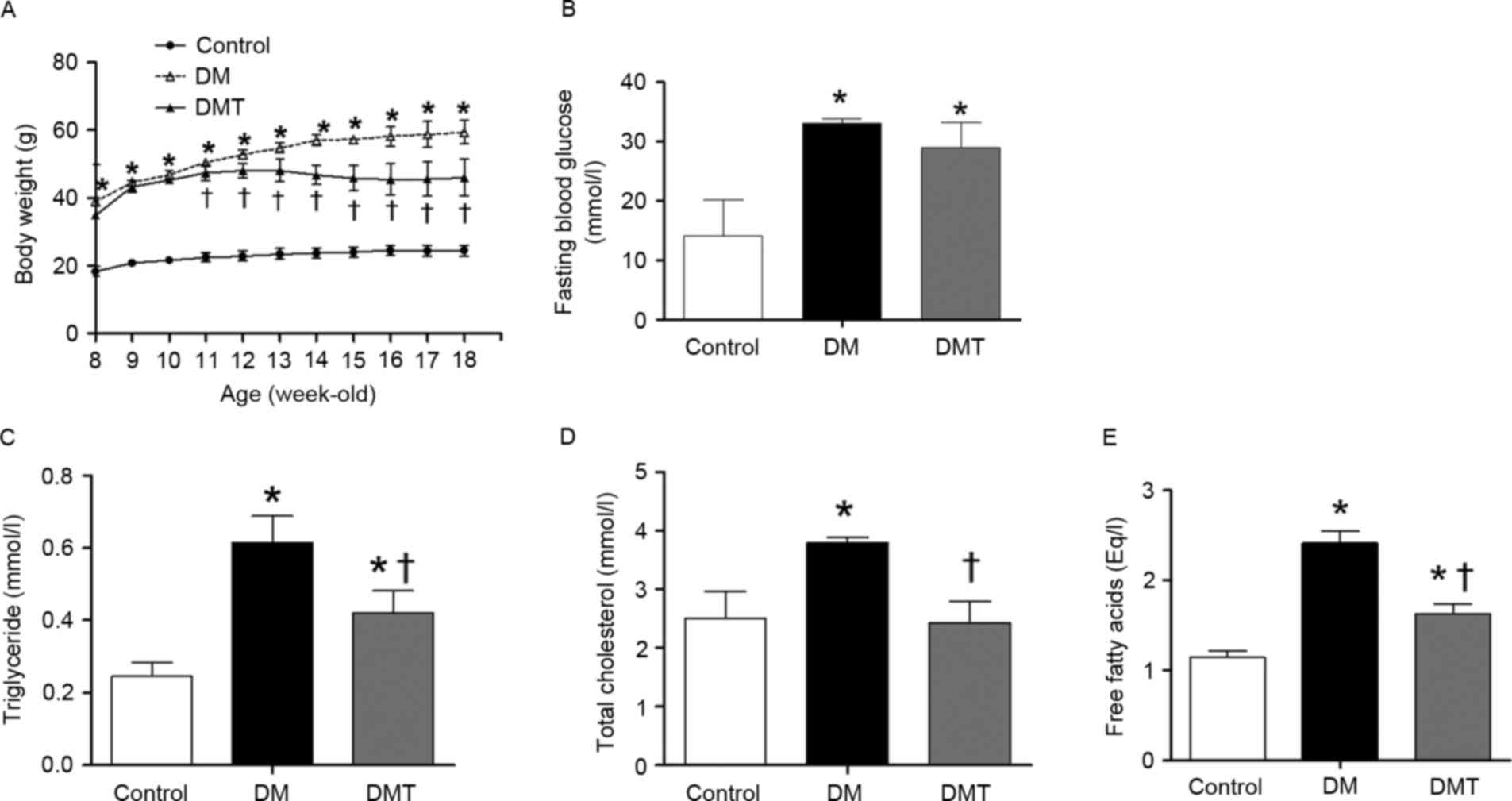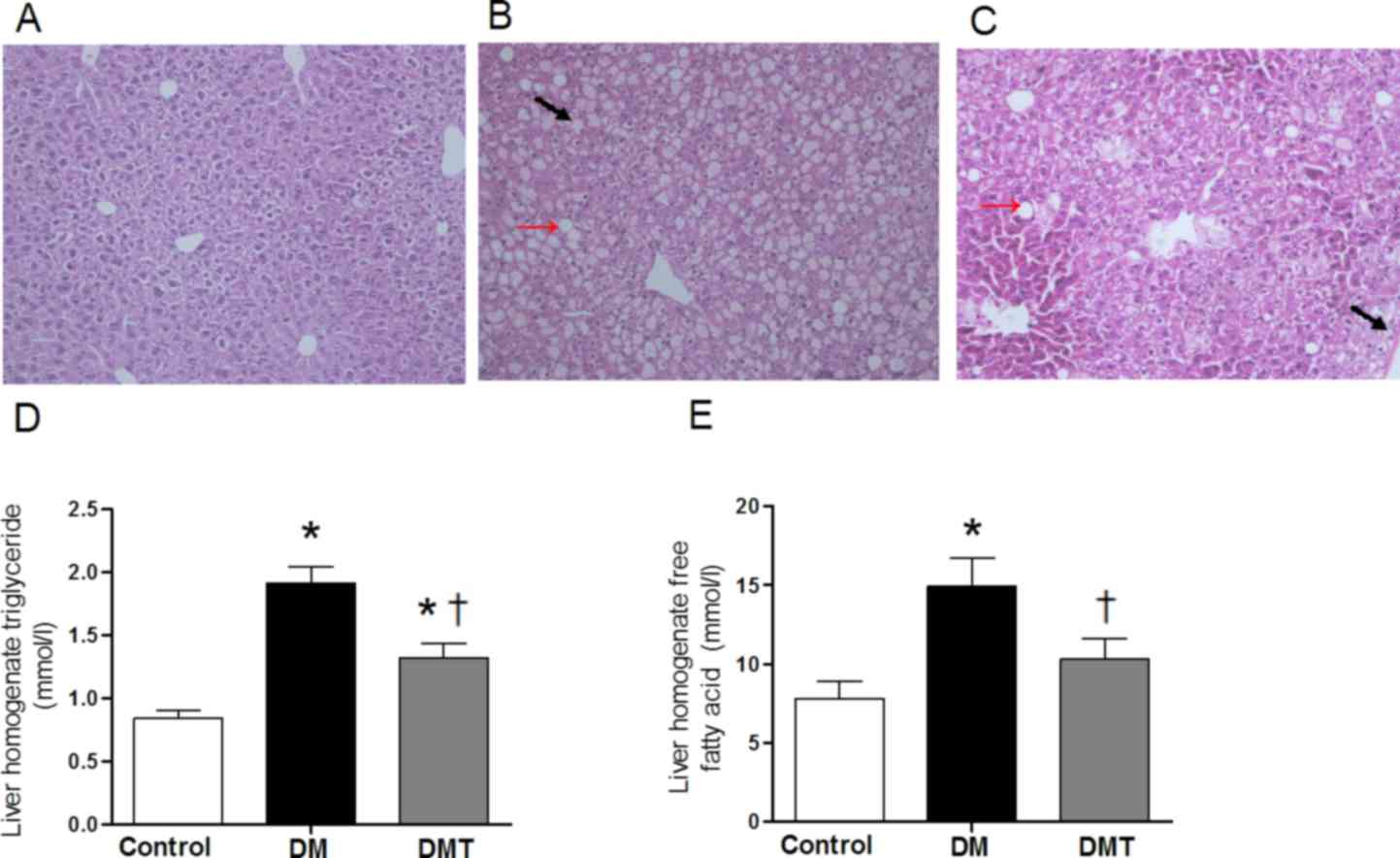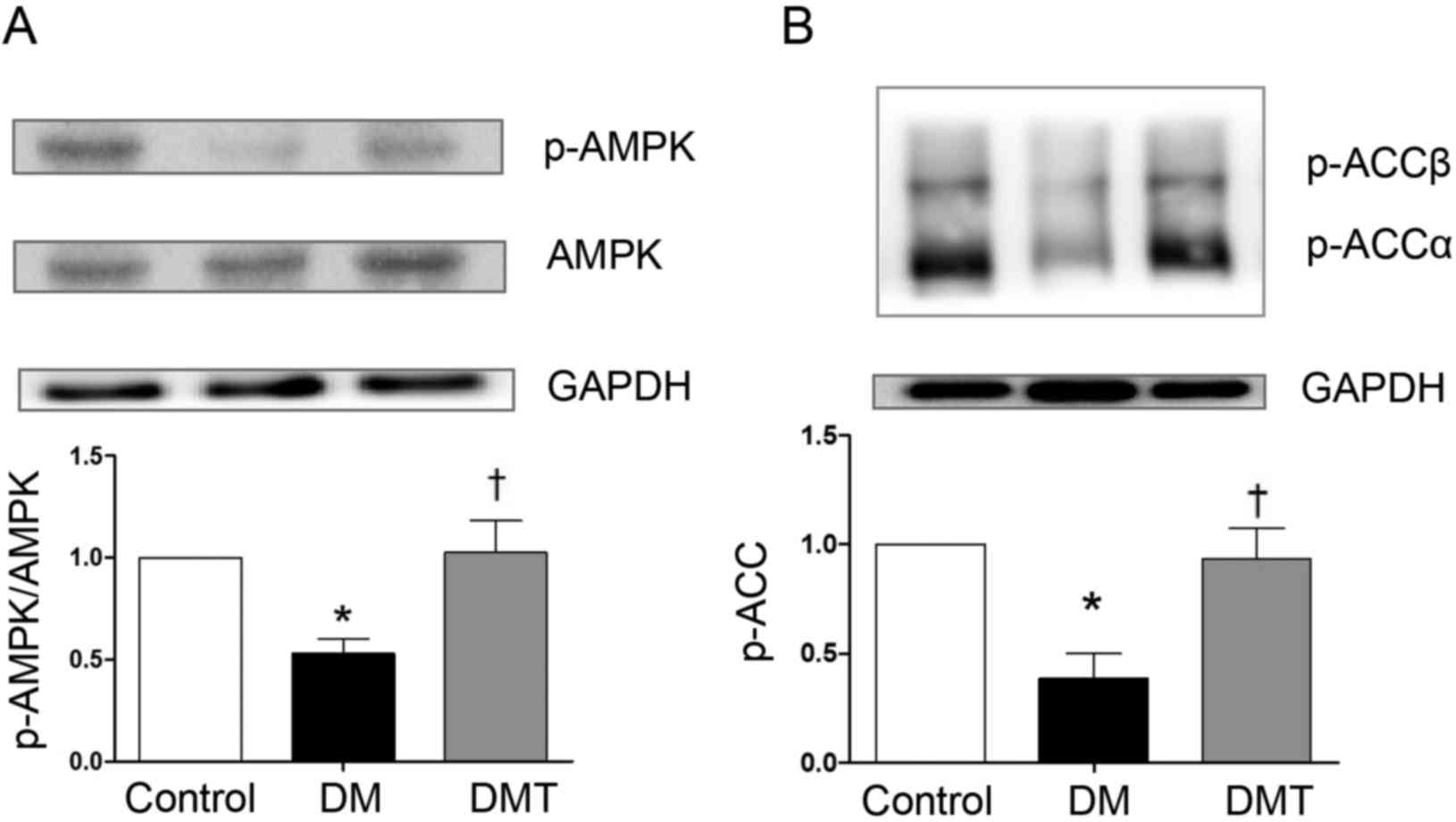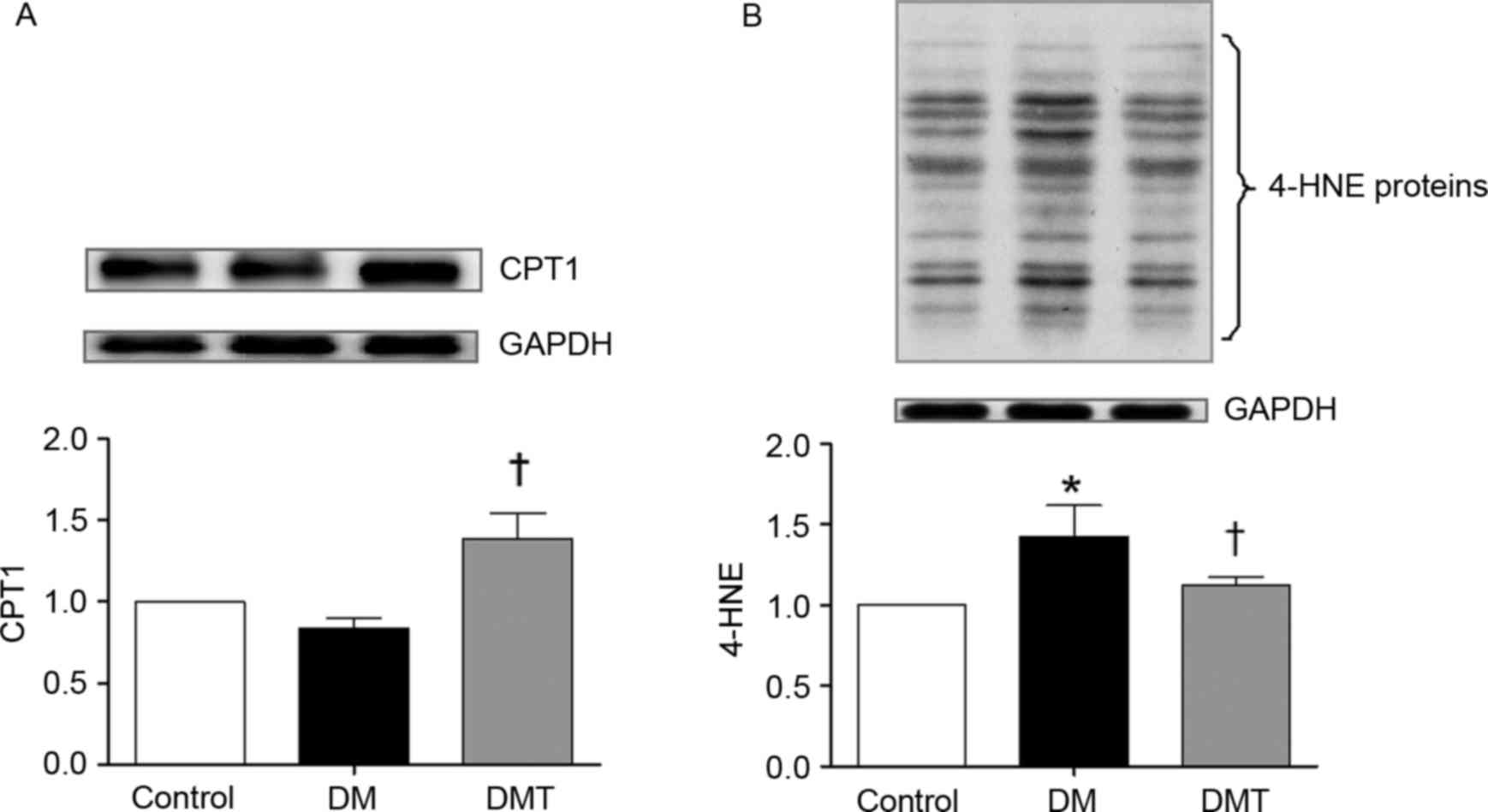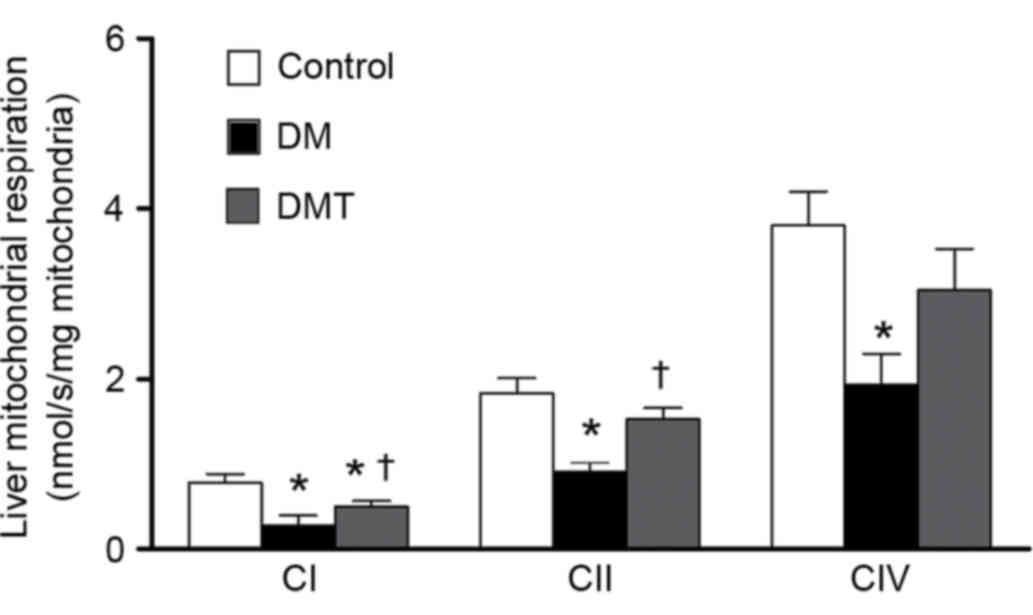|
1
|
American Diabetes Association, . Economic
costs of diabetes in the U.S. in 2012. Diabetes Care. 36:1033–1046.
2013. View Article : Google Scholar : PubMed/NCBI
|
|
2
|
Ginter E and Simko V: Type 2 diabetes
mellitus, pandemic in 21st century. Adv Exp Med Biol. 771:42–50.
2012.PubMed/NCBI
|
|
3
|
Goldberg IJ: Clinical review 124: Diabetic
dyslipidemia: Causes and consequences. J Clin Endocrinol Metab.
86:965–971. 2001. View Article : Google Scholar : PubMed/NCBI
|
|
4
|
Yan L, Xu MT, Yuan L, Chen B, Xu ZR, Guo
QH, Li Q, Duan Y, Fu J Huang, Wang YJ, et al: Prevalence of
dyslipidemia and its control in type 2 diabetes: A multicenter
study in endocrinology clinics of China. J Clin Lipidol.
10:150–160. 2016. View Article : Google Scholar : PubMed/NCBI
|
|
5
|
Bhatt HB and Smith RJ: Fatty liver disease
in diabetes mellitus. Hepatobiliary Surg Nutr. 4:101–108.
2015.PubMed/NCBI
|
|
6
|
Stefan N and Häring HU: The metabolically
benign and malignant fatty liver. Diabetes. 60:2011–2017. 2011.
View Article : Google Scholar : PubMed/NCBI
|
|
7
|
Hardie DG: AMP-activated protein kinase:
An energy sensor that regulates all aspects of cell function. Genes
Dev. 25:1895–1908. 2011. View Article : Google Scholar : PubMed/NCBI
|
|
8
|
Hou X, Xu S, Maitland-Toolan KA, Sato K,
Jiang B, Ido Y, Lan F, Walsh K, Wierzbicki M, Verbeuren TJ, et al:
SIRT1 regulates hepatocyte lipid metabolism through activating
AMP-activated protein kinase. J Biol Chem. 283:20015–20026. 2008.
View Article : Google Scholar : PubMed/NCBI
|
|
9
|
Viollet B, Foretz M, Guigas B, Horman S,
Dentin R, Bertrand L, Hue L and Andreelli F: Activation of
AMP-activated protein kinase in the liver: A new strategy for the
management of metabolic hepatic disorders. J Physiol. 574:41–53.
2006. View Article : Google Scholar : PubMed/NCBI
|
|
10
|
Wong AK, Howie J, Petrie JR and Lang CC:
AMP-activated protein kinase pathway: A potential therapeutic
target in cardiometabolic disease. Clin Sci (Lond). 116:607–620.
2009. View Article : Google Scholar : PubMed/NCBI
|
|
11
|
Ruderman NB, Saha AK and Kraegen EW:
Minireview: Malonyl CoA, AMP-activated protein kinase and
adiposity. Endocrinology. 144:5166–5171. 2003. View Article : Google Scholar : PubMed/NCBI
|
|
12
|
Zang M, Xu S, Maitland-Toolan KA, Zuccollo
A, Hou X, Jiang B, Wierzbicki M, Verbeuren TJ and Cohen RA:
Polyphenols stimulate AMP-activated protein kinase, lower lipids
and inhibit accelerated atherosclerosis in diabetic LDL
receptor-deficient mice. Diabetes. 55:2180–2191. 2006. View Article : Google Scholar : PubMed/NCBI
|
|
13
|
Terra X, Montagut G, Bustos M, Llopiz N,
Ardèvol A, Bladé C, Fernández-Larrea J, Pujadas G, Salvadó J, Arola
L and Blay M: Grape-seed procyanidins prevent low-grade
inflammation by modulating cytokine expression in rats fed a
high-fat diet. J Nutr Biochem. 20:210–218. 2009. View Article : Google Scholar : PubMed/NCBI
|
|
14
|
Sharma SD and Katiyar SK: Dietary grape
seed proanthocyanidins inhibit UVB-induced cyclooxygenase-2
expression and other inflammatory mediators in UVB-exposed skin and
skin tumors of SKH-1 hairless mice. Pharm Res. 27:1092–1102. 2010.
View Article : Google Scholar : PubMed/NCBI
|
|
15
|
Pajuelo D, Díaz S, Quesada H,
Fernández-Iglesias A, Mulero M, Arola-Arnal A, Salvadó MJ, Bladé C
and Arola L: Acute administration of grape seed proanthocyanidin
extract modulates energetic metabolism in skeletal muscle and BAT
mitochondria. J Agric Food Chem. 59:4279–4287. 2011. View Article : Google Scholar : PubMed/NCBI
|
|
16
|
Mansouri E, Khorsandi L and Abedi HA:
Antioxidant effects of proanthocyanidin from grape seed on hepatic
tissue injury in diabetic rats. Iran J Basic Med Sci. 17:460–464.
2014.PubMed/NCBI
|
|
17
|
Bao L, Cai X, Zhang Z and Li Y: Grape seed
procyanidin B2 ameliorates mitochondrial dysfunction and inhibits
apoptosis via the AMP-activated protein kinase-silent mating type
information regulation 2 homologue 1-PPARγ co-activator-1α axis in
rat mesangial cells under high-dose glucosamine. Br J Nutr.
113:35–44. 2015. View Article : Google Scholar : PubMed/NCBI
|
|
18
|
Bao L, Cai X, Dai X, Ding Y, Jiang Y and
Li Y, Zhang Z and Li Y: Grape seed proanthocyanidin extracts
ameliorate podocyte injury by activating peroxisome
proliferator-activated receptor-γ coactivator 1α in low-dose
streptozotocin-and high-carbohydrate/high-fat diet-induced diabetic
rats. Food Funct. 5:1872–1880. 2014. View Article : Google Scholar : PubMed/NCBI
|
|
19
|
Han S, Jiao J, Zhang W, Xu J, Wan Z, Zhang
W, Gao X and Qin L: Dietary fiber prevents obesity-related liver
lipotoxicity by modulating sterol-regulatory element binding
protein pathway in C57BL/6J mice fed a high-fat/cholesterol diet.
Sci Rep. 5:152562015. View Article : Google Scholar : PubMed/NCBI
|
|
20
|
Palmeira CM and Moreno AJ: Mitochondrial
bioenergetics: Methods and protocols. In: High-resolution
respirometryOXPHOS protocols for human cells and permeabilized
fibers from small biopsies of human muscle. Pesta D and Gnaiger E:
Humana Press; New York, NY: pp. 25–58. 2012
|
|
21
|
Kuznetsov AV, Veksler V, Gellerich FN,
Saks V, Margreiter R and Kunz WS: Analysis of mitochondrial
function in situ in permeabilized muscle fibers, tissues and cells.
Nat Protoc. 3:965–976. 2008. View Article : Google Scholar : PubMed/NCBI
|
|
22
|
Karamercan MA, Weiss SL, Villarroel JP,
Guan Y, Werlin E, Figueredo R, Becker LB and Sims C: Can peripheral
blood mononuclear cells be used as a proxy for mitochondrial
dysfunction in vital organs during hemorrhagic shock and
resuscitation? Shock. 40:476–484. 2013. View Article : Google Scholar : PubMed/NCBI
|
|
23
|
Zhang Z, Li BY, Li XL, Cheng M, Yu F, Lu
WD, Cai Q, Wang JF, Zhou RH, Gao HQ and Shen L: Proteomic analysis
of kidney and protective effects of grape seed procyanidin B2 in
db/db mice indicate MFG-E8 as a key molecule in the development of
diabetic nephropathy. Biochim Biophys Acta. 1832:805–816. 2013.
View Article : Google Scholar : PubMed/NCBI
|
|
24
|
Yu F, Li BY, Li XL, Cai Q, Zhang Z, Cheng
M, Yin M, Wang JF, Zhang JH, Lu WD, et al: Proteomic analysis of
aorta and protective effects of grape seed procyanidin B2 in db/db
mice reveal a critical role of milk fat globule epidermal growth
factor-8 in diabetic arterial damage. PLoS One. 7:e525412012.
View Article : Google Scholar : PubMed/NCBI
|
|
25
|
Luan SS, Yu F, Li BY, Qin RJ, Li XL, Cai
Q, Yin WB, Cheng M and Gao HQ: Quantitative proteomics study of
protective effects of grape seed procyanidin B2 on diabetic
cardiomyopathy in db/db mice. Biosci Biotechnol Biochem.
78:1577–1583. 2014. View Article : Google Scholar : PubMed/NCBI
|
|
26
|
Hardie DG: The AMP-activated protein
kinase pathway-new players upstream and downstream. J Cell Sci.
117:5479–5487. 2004. View Article : Google Scholar : PubMed/NCBI
|
|
27
|
Viollet B, Lantier L, Devin-Leclerc J,
Hebrard S, Amouyal C, Mounier R, Foretz M and Andreelli F:
Targeting the AMPK pathway for the treatment of Type 2 diabetes.
Front Biosci (Landmark Ed). 14:3380–3400. 2009. View Article : Google Scholar : PubMed/NCBI
|
|
28
|
Kim MK, Kim SH, Yu HS, Park HG, Kang UG,
Ahn YM and Kim YS: The effect of clozapine on the AMPK-ACC-CPT1
pathway in the rat frontal cortex. Int J Neuropsychopharmacol.
15:907–917. 2012. View Article : Google Scholar : PubMed/NCBI
|
|
29
|
Rasmussen BB, Holmbäck UC, Volpi E,
Morio-Liondore B, Paddon-Jones D and Wolfe RR: Malonyl coenzyme A
and the regulation of functional carnitine palmitoyltransferase-1
activity and fat oxidation in human skeletal muscle. J Clin Invest.
110:1687–1693. 2002. View Article : Google Scholar : PubMed/NCBI
|
|
30
|
McGarry JD, Mills SE, Long CS and Foster
DW: Observations on the affinity for carnitine and malonyl-CoA
sensitivity, of carnitine palmitoyltransferase I in animal and
human tissues. Demonstration of the presence of malonyl-CoA in
non-hepatic tissues of the rat. Biochem J. 214:21–28. 1983.
View Article : Google Scholar : PubMed/NCBI
|
|
31
|
Inoguchi T, Li P, Umeda F, Yu HY, Kakimoto
M, Imamura M, Aoki T, Etoh T, Hashimoto T, Naruse M, et al: High
glucose level and free fatty acid stimulate reactive oxygen species
production through protein kinase C-dependent activation of NAD(P)H
oxidase in cultured vascular cells. Diabetes. 49:1939–1945. 2000.
View Article : Google Scholar : PubMed/NCBI
|
|
32
|
Skripchenko A, Myrup A,
Thompson-Montgomery D, Awatefe H, Moroff G and Wagner SJ: Periods
without agitation diminish platelet mitochondrial function during
storage. Transfusion. 50:390–399. 2010. View Article : Google Scholar : PubMed/NCBI
|
|
33
|
Cuzzocrea S, Riley DP, Caputi AP and
Salvemini D: Antioxidant therapy: A new pharmacological approach in
shock, inflammation, and ischemia/reperfusion injury. Pharmacol
Rev. 53:135–159. 2001.PubMed/NCBI
|
|
34
|
Sovak M: Grape Extract, Resveratrol and
Its Analogs: A Review. J Med Food. 4:93–105. 2001. View Article : Google Scholar : PubMed/NCBI
|
|
35
|
Wren AF, Cleary M, Frantz C, Melton S and
Norris L: 90-day oral toxicity study of a grape seed extract
(IH636) in rats. J Agric Food Chem. 50:2180–2192. 2002. View Article : Google Scholar : PubMed/NCBI
|
|
36
|
Mennen LI, Walker R, Bennetau-Pelissero C
and Scalbert A: Risks and safety of polyphenol consumption. Am J
Clin Nutr. 81:(1 Suppl). S326–S329. 2005.
|















